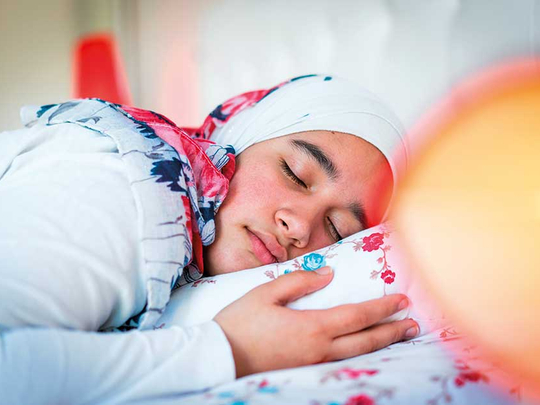
Dubai: If you are feeling a little too exhausted, unfocused and light headed during Ramadan, it may be due to irregular sleeping patterns.
Despite it being more than two weeks into Ramadan, many people have not found a sleeping routine that works for them.
Medical experts in Dubai talked to Gulf News about a few minor changes that could majorly improve energy levels and overall well-being during the fasting month.
Napping for longer than 20 minutes a day, along with the lack of exercise, and heavy meals just before bedtime is a recipe for disaster, experts agreed.
Setting a sleep schedule and sticking to it is the first step to keep your biological clock steady, and allow yourself to rest better, said Dr Fabrizio Facchini, Consultant Pulmonologist and expert in sleep and breathing disorders at Valiant Clinic.
He said that for those who consume a light Iftar and have a heavier meal later in the evening, it is advised to wait one to two hours before going to bed.
“A night’s sleep consists of three to six 90 minutes long repeating sleep cycles, each composed of different sleep stages. There are two main sleep stages: Rapid Eye Movement (REM) sleep and Non-Rapid Eye Movement (NREM) sleep,” he said.
While each sleep stage is associated with different types of brain activity and body functions, a fragmented sleep pattern affects the overall quality of sleep and can have consequences on the brain and body.
“This becomes a main concern in Ramadan when in addition to fragmented sleep many people might also have overall reduced hours of sleep,” said Dr Facchini.
Meanwhile, an active lifestyle has also been linked to improving length and quality of sleep.
Sara Al Mahayni, Clinical Dietitian at Valiant Clinic, said while it is safe to exercise two-three hours after each meal on a regular day, it is recommended to exercise a few hours before bedtime to avoid disrupting sleep during Ramadan.
“In fact, 30 minutes of aerobic exercise keeps your body temperature elevated for about four hours, inhibiting sleep. When your body begins to cool down, it signals your brain to release sleep-inducing Melatonin — after which you get drowsy,” she explained.
It is not recommended to exercise during the fast due to high risk of dehydration, fatigue and fainting in some cases. However, for those who exercise regularly, they should aim for 30-60 minutes session before Iftar to enable their bodies to replace the fluids lost at the end of the exercise session, added Al Mahayni.
Caffeine addicts
As for coffee and tea lovers, having to skip the stimulating ritual of sipping on a hot beverage in the morning can sometimes result in fatigue, irritability and headaches.
Al Mahayni, recommends focusing on water intake to replace fluids and staying away from consuming high amounts of caffeinated/high in sugar beverages including tea, coffee, and sodas.
It is best to consume caffeinated beverage far before bedtime or replace it with the decaffeinated versions to avoid unwanted alertness and difficulty in sleeping at night.
Another minor change that could help you sleep better is regulating your bedroom temperatures to between 19-24°C, said Dr Iman Abisourour, Consultant Internal Medicine at Valiant Clinic.
“Our understanding of the link between the body temperature and sleep has increased. It is now believed that people with sleep disorders or insomnia tend to have a warmer core body temperature which makes them more restless and hinders their ability to fall asleep,” she said.
Coupling that with a dark room, away from gadgets is also proven to improve sleep as light signals the brain to remain awake and alert.
Keep it light
When it comes to choosing a healthy suhour meal, it is important to consume a well-balanced meal late at night to have longer lasting energy during the day.
During fasting hours, the body uses glycogen, which is glucose stored in the liver to supply the body with a source of energy, said Al Mahayni.
Foods high in fibre/protein sources that are low in salt are recommended to avoid thirst. These include oatmeal with low fat milk and berries, boiled eggs, with whole wheat bread and vegetables. Foods to avoids include heavy meals that are packed with calories, sugar and fat such as fried foods and sweets. Such foods can cause unpleasant gastrointestinal symptoms such as reflux or indigestion for some people, which may cause disruption of sleep.
Just the same, beginning the habit of napping during Ramadan can have the opposite effect on your body, as sleep during naps is typically not long nor deep enough to provide the restorative benefits of night-time sleep.
Falling into deep sleep and then failing to complete the full sleep cycle usually results in sleep inertia, which causes the grogginess and disorientation you sometimes feel after waking up from a nap, explained Dr Abisourour. She recommends short “power nap” or “cat-nap” of 10-20 minutes.
“The general advice is that if you normally nap, you may continue to do so in Ramadan. If you do not usually nap, then avoid starting this habit in Ramadan. The exception of course is if you are not meeting your usual required hours of sleep at night, you carry the risk of developing a sleep deficit. Taking short naps during the day may help you meet your needs as a temporary measure with the goal of returning to your normal night-time sleeping pattern once the holy month is over,” added Dr Abisourour.












